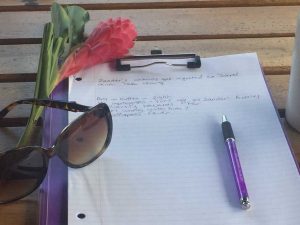Recently, a parent called to book their child on one of our summer writing camps. At the end of our conversation she said, rather hesitantly, “I’ve always wanted to write, too. It’s just than I don’t know where to begin.”
This blog is for her.
 Anyone can write. You don’t need terrific literacy skills, or a degree. You don’t need to be a keen reader, nor do you need excessive amounts of free time. Talent isn’t important, and neither is a fancy laptop. All you need is a pen (or pencil) and a sheet of paper. While some people write specifically for publication and others feel they need an audience for their writing to make it worthwhile, there are also plenty of writers who produce work just for themselves: for the pleasure of creating, the joy of escaping into another world or – quite often – to help them make sense of difficult experiences and emotions. Simply put, writing is for everyone.
Anyone can write. You don’t need terrific literacy skills, or a degree. You don’t need to be a keen reader, nor do you need excessive amounts of free time. Talent isn’t important, and neither is a fancy laptop. All you need is a pen (or pencil) and a sheet of paper. While some people write specifically for publication and others feel they need an audience for their writing to make it worthwhile, there are also plenty of writers who produce work just for themselves: for the pleasure of creating, the joy of escaping into another world or – quite often – to help them make sense of difficult experiences and emotions. Simply put, writing is for everyone.
But how do you begin?
Start by keeping a journal. Decide what type of journal you want to create. Will you keep a meticulous record of your life, day by day? Is your journal for your eyes only, or do you wish to keep an account of your experiences to gift to your children in the future? Will your journal be an outlet for your emotions? For a few years, I kept a journal that included only a record of natural experiences that gave me joy: birds sighted in the garden, amazing views on a hike, close encounters with animals on our Costa Rica retreats. I have a friend who records, each evening, the ten most positive and inspiring moments of their day. Often, her list consists of the most minute and seemingly insignificant things, such as a funny phrase overheard on the subway, or her child’s smile when he arrives home from school. But that’s the point, isn’t it?
Keep a small notebook with you at all times to record your ideas. This could be anything you think may one day belong in a poem, a short story or a piece of creative nonfiction. Record dreams you have, quirky tales you read in the newspaper, something unusual you see during the day, a phrase you hear and like. Challenge yourself to describe things you see in a way that captures the feelings they evoke. Your notebook is for your eyes only. After a few days, flick through the pages, and you’ll be surprised at what you’ve created: raw material for writing projects when you are ready to begin them.
Try some short writing prompts! How do you do this? Find a comfy chair, pour yourself a coffee (or tea!) and grab some paper. Set a timer for fifteen minutes, and write! Don’t try to produce something clever, or good. Just write. You’ll find dozens of prompts in other blogs on this site, but to begin with, try this: “You are home alone and the doorbell rings. On the other side of the door is a stranger, holding a package with your name on it. Begin by describing the stranger, then the package, and see where your writing takes you.” Remember what I said about not trying to produce ‘good’ writing? That’s too much pressure. Once you have something down on paper, you can start to shape and edit. Or, if you don’t like it, discard what you’ve written, and start again.
Look for a community of writers. When we enjoy doing something, it’s natural to surround ourselves with others who enjoy the same activity. Public libraries, community centres, colleges… all have writing workshops suited to beginners. You can find online communities for people who enjoy writing, and retreats like ours are a great way to kickstart a creative writing hobby. You may not want to share your work right away – and that’s fine. But sometimes, becoming part of a supportive group is all you need to take your writing to the next level. And the more you write, the more you will discover a voice that is uniquely your own.
